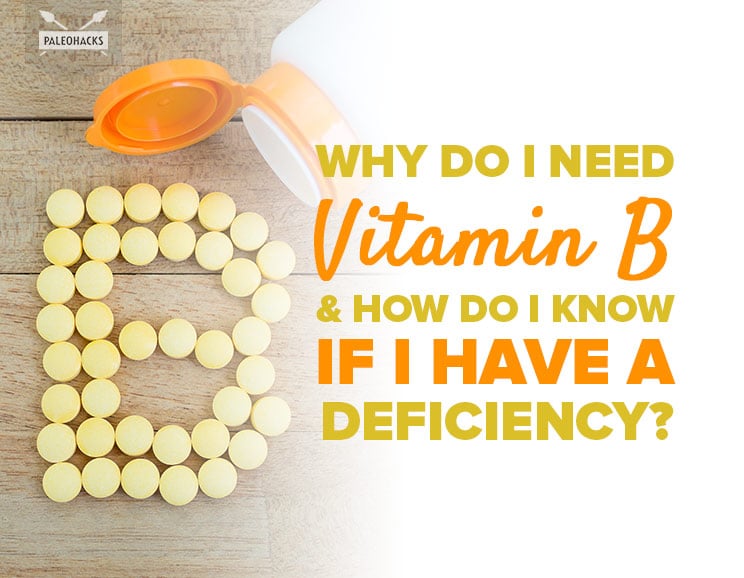B vitamins are vital for your physical and mental health. Here’s a breakdown of this key family of vitamins, and who is at risk for a deficiency.
Do you feel edgy or stressed out? While there are any number of factors in our chaotic lifestyles that could lead to those feelings, a lack of nutrients can decrease our body’s ability to tolerate stress.
The family of B vitamins is essential for neurological health, nutrient absorption, and so much more. While true deficiencies in the U.S. are below 10 percent for all age categories, marginal depletion levels – where there isn’t enough vitamin B to be optimal – affect closer to 20 percent of the population. (1)
Want to train your brain to be happier and healthier?
Click here to receive our FREE 7-Day Meditation Challenge!
Why Do You Need Vitamin B?
B vitamins are essential for the entire body, and primarily impact the brain and mental health. Here are the major mental benefits that B vitamins can provide.
Improves Mood: B vitamins can help fight depression with its mood-lifting effects. (2)
Boosts Cognition: The family of B vitamins helps to increase energy levels, preventing mental fatigue and supporting healthy cognitive performance. (3)
Calms Anxiety: B vitamins have a calming impact on the brain and can soothe anxiety. (4)
There are several types of B vitamins, and while each one has its own strengths, they work best when taken together. This is why supplements often include all forms in a single B-complex capsule.
Some people may require higher doses of individual B nutrients depending on their health and medical conditions.
Vitamin B12

What it does:
B12 is required for many body processes, including (5):
- Producing red blood cells
- Neurological function
- DNA synthesis
- Heart health
Natural food sources:
- Fish, meat, and poultry
- Offal
- Eggs
- Nutritional yeast
Signs you’re not getting enough:
Vitamin B12 is released from foods by stomach acid and digestion. This means that when digestion is impaired, even if you eat an adequate amount, you may still suffer from low levels. Signs you might not be getting enough B12:
- Fatigue and muscle weakness
- Constipation and loss of appetite
- Numbness and tingling in hands and feet
- Poor memory or concentration
- Mouth sores
Vitamin B6

B6 is effective at relieving nausea and is a popular remedy for morning sickness. In fact, B6 is often a component of prescription nausea medications.
What it does:
B6 does more for the body than ease a queasy stomach, including: (6)
- Breaking down protein, carbs, and lipids
- Produces neurotransmitters and helps with cognition
- Strengthens immunity
Natural food sources:
- Seafood
- Offal
- Poultry
- Starchy vegetables
- Non-citrus fruits
Signs you’re not getting enough:
B6 deficiency on its own is uncommon. However, if you’re low in B12 and folate (B9), you might be low in B6, too. You might not be getting enough B6 if you experience the following:
- Cracks at the corners of the mouth
- Swollen tongue
- Depression
- Confusion
- Weakened immunity
- Irritability
Vitamin B1

Also known as thiamine, vitamin B1 is vital for cellular health and energy metabolism.
What it does:
Without adequate B1 levels, your body won’t be able to rev up its energy levels or metabolism. Other vital functions include: (7)
- Breaking down glucose, amino acids, and lipids
- Growth and development of cells
- Energy and metabolism
Natural food sources:
Thiamine is found in many food sources, although fruits have a lower concentration per serving than meat and seafood.
- All types of meat, especially pork
- Fish
- Fruits
Signs you’re not getting enough:
You likely aren’t low in B1 unless you’re low in all the B vitamins, but if you were, you might notice:
- Weight loss
- Confusion
- Short-term memory loss and other cognitive problems
- Muscle weakness
- Cardiovascular problems
Vitamin B2

Riboflavin, also known as vitamin B2, is vital for energy production and cellular health. It works in conjunction with other B vitamins, and functions as an antioxidant in the body.
What it does:
B2 helps the body make energy, but it’s also needed for: (8)
- Breaking down fats, drugs, and steroids
- Cellular function
- Converting amino acids into vitamins
- Regulating inflammation levels
Natural food sources:
Riboflavin is found in several food sources, with eggs and organ meats offering up the highest levels per serving.
- Eggs
- Offal
- Mushrooms
- Beef and poultry
- Green vegetables
Signs you’re not getting enough:
You might not be getting enough riboflavin if you experience:
- Low thyroid hormone levels
- Skin disorders
- Mouth and throat swelling
- Mouth lesions or cracked lips
- Hair loss
- Infertility
- Red, itchy eyes or cataracts
- Liver problems
- Nervous system disorders
- Anemia
Vitamin B3

Vitamin B3 is also known as niacin, and it’s vital for converting food into energy.
What it does:
Niacin helps break down food to be used for cellular energy, but it also helps with: (9, 10, 11, 12, 13)
- Balancing LDL and HDL cholesterol levels
- Lowering triglyceride levels
- Increasing brain function
- Supporting healthy skin
- Decreasing arthritis pain
Natural food sources:
- Poultry, especially chicken breast
- Beef
- Seafood
Signs you’re not getting enough:
You may not be getting enough niacin if you’re also struggling to get enough of the other B vitamins. Signs of low levels might include:
- Memory loss and cognitive problems
- Fatigue
- Depression
- Headaches
- Skin disorders
- Diarrhea or intestinal irritation
Vitamin B9

Also known as folate or folic acid, vitamin B9 is popular for its use in pregnancy to prevent neural tube defects.
What it does:
Folate is vital for cellular growth and development as well as the formation of blood cells. It’s also needed for: (14)
- Synthesizing DNA and RNA
- Metabolizing amino acids
- Creating blood cells
Natural food sources:
Folate is one of the few B vitamins that is found in the highest levels in non-animal products. Foods rich in folate include:
- Dark green leafy vegetables
- All fruits
- Nuts
- Meat, seafood, and poultry
- Eggs
- Offal
- Yeast
Signs you’re not getting enough:
Folate deficiency on its own is uncommon. However, it can be found in conjunction with B12 or other B vitamin deficiencies or low levels. Signs of folate deficiency can include:
- Anemia
- Physical weakness
- Poor concentration
- Irritability and mood swings
- Headaches
- Tongue and mouth sores
- Skin, hair, or nail changes
Who Is At Risk For Vitamin B Deficiency?

While most people who eat a balanced diet are going to get regular exposure to B vitamins, some may be prone to low levels due to absorption issues.
Fortunately, you don’t typically need to worry about over-supplementing with B vitamins. All B vitamins are water-soluble, meaning that excess amounts pass out of the body via the urine. This lessens the risk of toxicity from overexposure. Even so, following supplement recommendations from your practitioner is always safest.
Vegans and Vegetarians
B vitamins are most widely found in animal products. So if you don’t eat meat or any animal products, you’re going to get significantly less exposure to B-complex than someone eating a diet rich in meats.
People with MTHFR mutations
This genetic mutation alters the way homocysteine is converted in the body. People with the MTHFR mutation might not be able to absorb or activate B vitamins unless they take specialized supplemental forms.
Women on Birth Control
The hormones in most birth control prescriptions alter the way that the body uses vitamin B, and can interfere with absorption.
Pregnant Women
If you’re trying to get pregnant, it’s important that you get enough folate and B-complex. Even slightly low folate levels can increase the risk of neural tube defects, so most doctors recommend a prenatal vitamin that contains ample amounts of folate. Some will recommend an additional B-complex vitamin that is an activated form to ensure maximum absorption.
Older Adults
Age decreases the body’s ability to effectively digest and break down nutrients, and B vitamins are particularly susceptible to this.
People with Chronic Conditions
If you have chronic or autoimmune disorders, your chances of being unable to absorb B vitamins is higher. People with celiac disease, Crohn’s disease, and thyroid disorders may struggle to break down their food. A lack of B vitamins worsens each of these conditions.
Drinkers
Alcoholics or people who regularly drink alcohol might be less able to absorb and digest B vitamins.
Bottom Line
B vitamins are essential for a healthy body and brain. Without enough of the family of B vitamins, the body will be sluggish and deprived of critical nutrients that fend off a host of chronic disorders.
Supplementing with B vitamins is generally considered safe. However, over-supplementing one without balancing the rest can result in other problems or mask symptoms of deficiencies. Ask your doctor for recommendations on how to supplement B vitamins if you fall into one of the categories of people who might be prone to lower levels.

(Read This Next: 9 Nutrient Deficiencies, Symptoms and Foods to Correct Them



 Tortilla-Free Primal Chicken Wraps
Tortilla-Free Primal Chicken Wraps


Show Comments